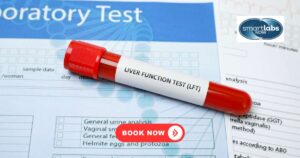
A liver function test is a specialized blood panel designed to assess the health of the liver by measuring specific enzymes, proteins, and other substances released into the bloodstream.
It serves as an early warning system for liver disease or subtle damage that may not yet cause symptoms.
In Portland, Oregon, Smartlabsnow laboratories use state-of-the-art techniques during careful blood draws to ensure reliable results.
This test forms one part of a broader approach to understanding overall metabolic and endocrine health, for example, assessments like thyroid hormone evaluations help complete the picture of your metabolism.

The liver panel measures several key markers. Each component provides insight into different aspects of liver function:
These enzymes signal liver cell stress or damage when elevated. They are among the earliest indicators of inflammation or injury.
In clinical practice, professionals often compare these markers with other hormonal assays, such as those for Progesterone to evaluate systemic effects on liver function.
Found in the lining of bile ducts, ALP levels that rise beyond the normal range can indicate blockage or damage in these pathways.
It is typically interpreted alongside other enzymes since similar increases might be noted in bone-related conditions.
GGT is particularly sensitive to changes in the bile ducts and can reveal early hepatobiliary issues.
Its measurement alongside ALP can help clarify whether elevations are truly liver-related, a nuance that underscores the importance of a comprehensive metabolic assessment.
As a product of red blood cell breakdown, bilirubin is processed by the liver.
Higher levels especially of direct bilirubin, can indicate dysfunction related to bile flow or liver damage.
When hepatitis or other liver infections are a concern, additional evaluations can help refine the diagnosis.
Produced exclusively by the liver, albumin levels provide insight into the organ’s capacity to synthesize proteins.
In a complete evaluation, albumin is compared with total protein levels to help detect chronic liver disease.
This marker evaluates how quickly your blood clots.
Since the liver produces many clotting factors, prolonged clotting times may indicate compromised function, a detail especially relevant when assessing overall inflammatory status.
This 2000 study by Pratt DS and Kaplan MM states that abnormal liver enzyme results in asymptomatic patients require thorough evaluation to determine the underlying cause, even when patients present no overt symptoms.

A certified healthcare professional collects a blood sample via a venous draw.
In local Portland settings, labs use careful techniques for this procedure, similar to the practices seen in specialized tests like the Magnesium Blood Test or the Testosterone Test.
In the laboratory, the blood sample is analyzed for markers such as ALT, AST, ALP, GGT, bilirubin, albumin, and clotting factors.
Modern equipment and stringent quality controls ensure every test result is thoroughly evaluated.
If the liver function test shows abnormal trends, further diagnostic evaluations may be recommended.
These might include imaging studies or even a liver biopsy.
For more comprehensive insights, evaluations may be combined with assessments like the Homocysteine Blood Test to obtain a clearer picture of overall cardiovascular health.
This 2014 study by Wong GLH states that modern laboratory methods for evaluating liver diseases including the measurement of ALT, AST, ALP, GGT, and bilirubin are critical for early detection and management, ensuring that quality-controlled assays guide clinical decision-making.

Normal values suggest that your liver is functioning effectively.
Abnormal values such as elevated enzyme levels or altered protein markers can indicate potential inflammation, injury, or impaired function.
These results are always interpreted in the context of your overall health, often alongside related assessments.
For instance, when ALT and AST are elevated together with increased GGT and ALP, early liver damage or bile duct issues may be present.
When enzyme levels remain within the normal range, it typically confirms that the liver is performing its functions as expected.
This 2018 study by Chalasani N, Younossi Z, Lavine JE, et al. states that the diagnosis and management of non‐alcoholic fatty liver disease (NAFLD) depend on a careful interpretation of liver test results. It underscores the importance of context in evaluating liver enzymes and imaging findings.

If your test results suggest abnormalities, your healthcare provider will review your full medical history alongside your physical examination findings before recommending additional tests.
These may include further imaging studies or a liver biopsy to pinpoint the issue.
Lifestyle adjustments can also be a vital part of the management plan; this might involve dietary changes, reducing alcohol intake, or regular follow-up testing to track liver improvements.
This overall strategy often incorporates assessments of metabolic and hormonal balance.

Routine liver screening is a cornerstone of preventative healthcare.
Regular testing can catch early signs of liver dysfunction, which is particularly important for individuals with risk factors such as heavy alcohol use, metabolic disorders, or a family history of liver conditions.
This proactive approach complements evaluations in other areas, such as endocrine health or cardiovascular assessments.
Ans: It is a blood test that evaluates enzymes, proteins, and clotting factors to assess liver health and detect potential liver damage or disease.
Ans: A blood sample is drawn from a vein and analyzed for markers like ALT, AST, ALP, GGT, bilirubin, and albumin in a certified laboratory.
Ans: Elevated enzyme levels or altered protein markers may indicate liver inflammation or damage. These findings are interpreted in the context of your overall health, often alongside other assessments, such as those for endocrine or metabolic function.
Ans: Regular screening is advisable for individuals at risk. Periodic testing is usually integrated into a broader preventative care plan, which may include assessments of thyroid or cardiovascular health.
Ans: Depending on the laboratory protocol, you may be asked to fast or avoid alcohol and certain medications for 24 hours before the test.

Smart Labs Now offers quick, discreet, and affordable testing services throughout Portland, Oregon. Our confidential evaluations ensure accurate insights into your liver function and overall health.
Book your test with Smart Labs Now and experience top‑tier service at your convenience.
DISCLAIMER:
Please consult your primary care physician before engaging with any pharmaceutical, natural substances, or activity regimens mentioned or prescribed in this post. Smart Labs Now is not responsible for health or life outcomes based on the information or recommendations provided. This account does not serve as a substitute for professional medical advice or assistance.